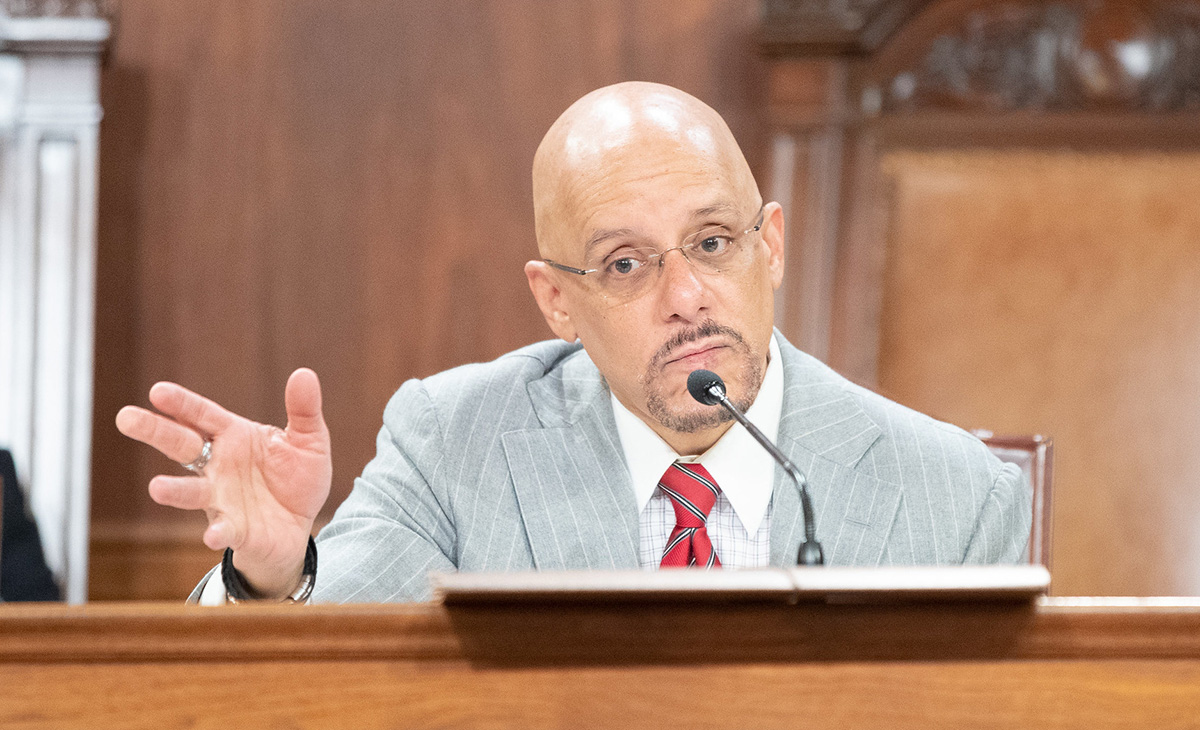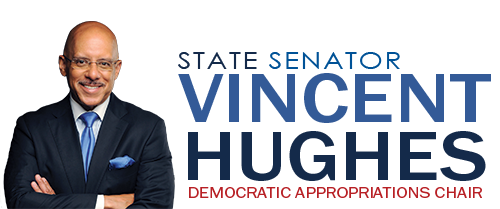
Harrisburg - 4 de junio de 2020 - A petición de los senadores estatales Art Haywood (D-Filadelfia / Montgomery), Anthony Williams (D-Filadelfia / Delaware, Vince Hughes (D-Filadelfia), y Shariff Street (D-Filadelfia), el Comité de Política Demócrata del Senado celebró hoy una audiencia pública virtual para discutir el impacto devastador de la pandemia de COVID-19 en la comunidad afroamericana.
"Esta audiencia pretende averiguar por qué tantos afroamericanos están muriendo de COVID-19", dijo Haywood.
Hughes añadió: "Sabemos desde hace tiempo que políticas como la de las "redlining" han mantenido a las comunidades de color segregadas de los barrios más ricos y blancos. La ciudad de Filadelfia es uno de los peores ejemplos de redlining en EE.UU., por lo que no es de extrañar que la población negra y morena de la ciudad se esté llevando la peor parte de la pandemia. Este tipo de racismo institucional ha provocado las devastadoras consecuencias para la salud que se han visto magnificadas por la pandemia de COVID-19, y ya es hora de que abordemos las cuestiones que están en la raíz de este problema."
El Dr. Rashawn Ray, del Brookings Research Institute, señaló que, en el conjunto de Pensilvania, "los negros representan el 20% de las muertes por COVID-19, pero sólo el 11% de la población del estado".
El Dr. Uché Blackstock, director general y fundador de Advancing Health Equity, afirmó: "Si los estadounidenses negros hubieran muerto al mismo ritmo que los blancos, unos 13.000 estadounidenses negros seguirían vivos hoy".
El Dr. Blackstock dijo también que los hombres negros tienen la esperanza de vida más corta, los bebés negros la tasa de mortalidad infantil más alta y las mujeres negras las tasas de mortalidad materna más elevadas.
"Vivir en este país ha hecho que los negros estadounidenses enfermen", afirma el Dr. Blackstone.
Los informes del Inquirer también revelan que los trabajadores afroamericanos tienen más probabilidades de ocupar puestos de trabajo esenciales con salarios bajos, como dependientes de supermercado, repartidores y otros empleos en el sector servicios. Esto aumenta las probabilidades de exposición y limita los recursos para tomarse tiempo libre si ellos o un miembro de su familia enferman o se infectan con COVID-19.
"Es injustificable que, además de realizar trabajos esenciales que les ponen en riesgo, los miembros de la comunidad afroamericana tengan también muchas más probabilidades de contraer este virus y de morir a causa de él", afirmó Williams. "Debemos hacer más por la comunidad afroamericana en términos de asistencia sanitaria ahora durante esta pandemia, y también debemos seguir trabajando para derribar las barreras a las que se enfrentan los afroamericanos cuando se trata de acceder a una asistencia sanitaria de calidad."
El Dr. Ray también señaló que los problemas de salud de la comunidad negra no se manifiestan porque los negros no se cuiden, sino que se enfrentan a mayores índices de problemas de salud porque los recursos sanitarios son criminalmente inadecuados en los barrios en los que viven.
Street añadió: "Estoy muy agradecido a las iglesias y a los médicos comunitarios que han dado un paso al frente para proporcionar pruebas y recursos en nuestras comunidades afroamericanas durante esta pandemia, pero no deberíamos tener que depender de su buena voluntad para acceder a los servicios sanitarios. Nosotros, como legislatura, y nosotros, como sociedad, debemos derribar las barreras que han causado tantas pérdidas y sufrimientos innecesarios en nuestras comunidades."
La Dra. Priscilla Mpasi, médico adjunto de la División de Pediatría Comunitaria del Hospital Infantil de Filadelfia, también afirmó que, aunque la mayoría de los datos se recogen sobre pacientes de COVID-19, no podemos olvidar las repercusiones que este virus y sus implicaciones sociales tienen sobre los niños y las familias en su conjunto.
"Personalmente he sido testigo de las repercusiones del COVID-19 en los niños, desde la disminución de las visitas de control, la reducción de las tasas de vacunación, las interrupciones de la educación, la inseguridad alimentaria y la inestabilidad de la vivienda", dijo el Dr. Mpasi. "Igualmente preocupantes son las citas perdidas por niños con enfermedades crónicas y necesidades especiales de atención sanitaria. Estamos observando un aumento de las lesiones domésticas y prevemos un aumento de la obesidad infantil, así como de la ansiedad y la depresión, especialmente en nuestros adolescentes."
El Dr. Ray también mencionó una serie de recomendaciones específicas que pueden aplicarse para mejorar los resultados sanitarios de la comunidad afroamericana durante esta pandemia y en todos los ámbitos de la atención sanitaria. Entre ellas se incluyen la publicación inmediata de los datos demográficos de los afectados por el COVID-19, la necesidad de ubicar centros de pruebas y triaje en los barrios negros, la garantía de que los trabajadores esenciales tengan permisos remunerados, la prestación por peligrosidad para todos los trabajadores esenciales, un salario mínimo digno para todos los trabajadores y la asistencia sanitaria universal.
La senadora Lisa Boscola (D- Lehigh/Northampton), que preside el Comité de Política Demócrata del Senado, añadió: "Doy las gracias a mis colegas por solicitar esta audiencia, porque a medida que comenzamos a reabrir nuestras comunidades debemos tomar las duras lecciones que hemos aprendido durante esta pandemia y utilizarlas como catalizador para crear mejoras muy necesarias. Necesitamos un sistema sanitario que cubra las necesidades de todos los ciudadanos de Pensilvania."
En la audiencia de hoy han testificado las siguientes personas:
- Dr. Uche Blackstock, Fundador y Director General, Advancing Health Equity
- Rashawn Ray, Ph.D, David M. Rubenstein Fellow, The Brookings Institution Dra. Carmen E. Guerra, Associate Director of Diversity and Outreach, Hospital of the University of Pennsylvania
- Dra. Shaneeta Johnson, Profesora Asociada de Cirugía, Investigadora Principal, Instituto de Liderazgo Sanitario Satcher, Facultad de Medicina Morehouse
- Dr. Orland Kirton, Philadelphia Collaborative for Health Equity, Presidente, Departamento de Cirugía Jefferson, Abington Hospital
- Dra. Argie Allen-Wilson, experta en relaciones, F.A.I.T.H. Connects LLC, curación terapéutica familiar e individual
- Greg Millett, M.P.H., Vicepresidente y Director de Políticas Públicas, amFAR, Fundación para la Investigación del Sida
- Dr. Calvin B. Johnson, Director de Altre Strategic Solutions Group, LLC; ex Secretario de Sanidad de Pensilvania
- Dra. Priscilla Mpasi, médico adjunto, División de Pediatría Comunitaria, Hospital Infantil de Filadelfia; Copresidenta del Consejo de Mujeres Médicas, Asociación Médica Nacional.
Los senadores Larry Farnese (demócrata de Filadelfia), Judy Schwank (demócrata de Berks), Katie Muth (demócrata de Berks/Chester/Montgomery), Maria Collett (demócrata de Bucks/Montgomery), Tim Kearney (demócrata de Delaware/Chester), Pam Iovino (demócrata de Allegheny/Washington) y Lindsey Williams (demócrata de Allegheny) también asistieron a esta audiencia.
La grabación completa de la audiencia estará disponible en senatorboscola.com/policy.
###
